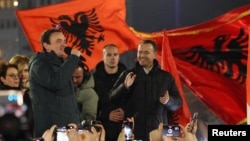PRISTINA -- The Democratic Party of Kosovo (PDK) say they will not enter a coalition government with incumbent Prime Minister Albin Kurti’s Self-Determination Movement (LVV), which won last weekend's parliamentary elections.
Kosovo’s Central Election Commission (CEC) on February 11 said that with 99 percent of ballots counted, LVV had around 41 percent of the vote, short of a majority.
PDK secured 22 percent of the ballots followed by Democratic League of Kosovo (LDK) with 18 percent and the Alliance for the Future of Kosovo (AAK) and its partner NISMA with around 7 percent. Observers say diaspora ballots will slightly shift the shares of vote, likely in Kurti's favor.
The weekend elections were seen as key in determining who will lead Kosovo amid stalled talks on normalizing ties with Serbia and while foreign funding for one of Europe's poorest countries has been thrown into doubt. Serbia doesn't recognize Kosovo’s independence.
Forecasts for the distribution of seats in parliament give Kurti 54 mandates, meaning he would need seven more to form a majority.
"It's unlikely that [Kurti] will be able to form a government, but I don't think even the opposition have the unity to form a coalition," Rrahman Paçarizi, professor at the Department of Journalism at the University of Pristina, told RFE/RL, adding that the odds of an early election were high due to the political deadlock.
Kurti's rival and PDK candidate Bedri Hamza told a news conference on February 10 that there were "major differences" that prevented the formation of a coalition and accused LVV of wanting "absolute power" and of having "no plan" to run the country.
AAK leader Ramush Haradinaj struck a similar tone, saying he would "gladly cooperate with Albanian opposition parties" to form a majority government.
Lumir Abdixhiku, the leader of LDK, said the party will comment after the vote count.
Despite winning the February 9 elections, LVV’s support fell by around 10 percent compared to the 2021 elections.
David Kanin, professor of European Studies at Johns Hopkins University in Washington, told RFE/RL that it remains to be seen if Kurti sticks to his pledge not to form a coalition if it means being shut out of power.
"Part of it depends on whether Kurti really means what he says when he says he won't go into a coalition. I don't know if he really believes that," Kanin said.










